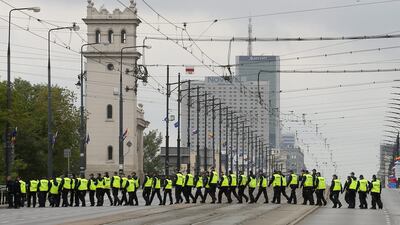This week’s Nato Summit in Warsaw will see the alliance reaffirming its unity and sense of purpose in the face of multiple security challenges. New military deployments in Central and Eastern Europe will be approved to ward off a resurgent Russian threat. Nato will also renew offers of help to stabilise conflict zones in the “arc of crises” running from North Africa to Afghanistan. Questions remain, however, over how far the alliance can maintain its resolve given looming political crises in some of its member states.
Nato secretary Jens Stoltenberg has promised “a faster, a stronger, and a more ready alliance”. The Warsaw meeting will agree to station four multinational battalions of 1,000 personnel each in Estonia, Latvia, Lithuania and Poland. Additional plans to set up a multinational brigade in Romania to enhance local cyber-defence and civil defence will also be discussed. Mr Stoltenberg has announced an $8 billion increase in total defence spending by alliance members, reversing years of declining defence budgets.
The alliance will also boost its presence in the Middle East. Awacs surveillance aircraft will be offered to enhance the US-led coalition combating ISIL in Syria and Iraq. In addition, Nato plans to increase the assistance that it provides to Iraq’s armed forces. Nato remains willing to develop the Istanbul Cooperation initiative in partnership with the GCC countries to build up joint command structures.
The alliance has also pledged to maintain its mission in Afghanistan, Operation Resolute Support, focused on building up Afghan security forces, until at least 2020 at a cost of $6 billion a year. As well as the continued threat posed by the Taliban, the emergence of ISIL-affiliated groups in Afghanistan is a cause for concern. Barack Obama’s decision to maintain US force levels at 8,400 beyond his term in office is a response to the persistence of the ongoing insurgency.
Apart from out-of-area initiatives, Nato’s primary focus is on strengthening the “front line” states seen as being at greatest risk from Russian aggression. Since Russia occupied the Crimean Peninsula in March 2014, all cooperation has effectively been suspended. While Mr Stoltenberg hopes to continue dialogue with Moscow, a Nato-Russia Council meeting in April this year only served to highlight continued deep differences.
Vladimir Putin is far too calculating to risk an outright confrontation with the alliance. Rather than precipitating a direct conflict, the Kremlin will seek to bypass Nato to exploit political discontent in Europe through “hybrid war” tactics such as propaganda and subtle support for European populist movements.
Growing disenchantment in some Nato states offers Moscow ample scope for interference. In the midst of the political turbulence in the UK, David Cameron’s government is keen to demonstrate its readiness to support the alliance by committing itself to providing troops and taking command of one of the mooted multinational battalions.
The question for the UK is whether the government can maintain defence spending at current levels if the current economic downturn is more severe than expected. Previous British foot-dragging on meeting Nato’s requirement that members should spend at least 2 per cent of their GDP on defence has already caused friction with Washington.
In Germany, there are tensions in the ruling coalition over the current policy of isolating Russia. Senior members of the Social Democratic Party, the coalition’s junior member, have made no secret of their conviction that sanctions against Moscow should be relaxed. In response to a recent Nato exercise simulating a Russian attack on Poland, German foreign minister Frank-Walter Steinmeier warned that the alliance should not “inflame the situation further through sabre-rattling and warmongering”.
The current US administration, which has focused on a pivot to the Asia-Pacific region, has been accused of having a lukewarm attitude to European security cooperation. Although Washington has made a belated commitment to increase its defence spending in support of Eastern Europe, Nato members will be looking nervously at Donald Trump’s bid for the White House. He appears committed to an isolationist foreign policy and has publicly voiced his disdain for military “free riders” in the alliance.
On the related aims of sanctions relief and disruption of Nato and the European Union, Russia is prepared to bide its time knowing that many western leaders are seeing out their last months in office. In addition to the departures of Mr Cameron and Mr Obama, Angela Merkel and François Hollande could well struggle to win elections next year.
The packed agenda and eye-catching announcements lined up for the Warsaw summit are intended to signal a renewed sense of mission in the face of a range of threats. However, the alliance’s concerns will be seen by many Europeans as only marginally relevant given Brexit, growing popular resentment against economic austerity and a continued influx of refugees from Syria. Nato’s pledges of solidarity could be undermined by an escalating series of domestic crises before its next summit in 2018.
Stephen Blackwell is an international politics and security analyst

